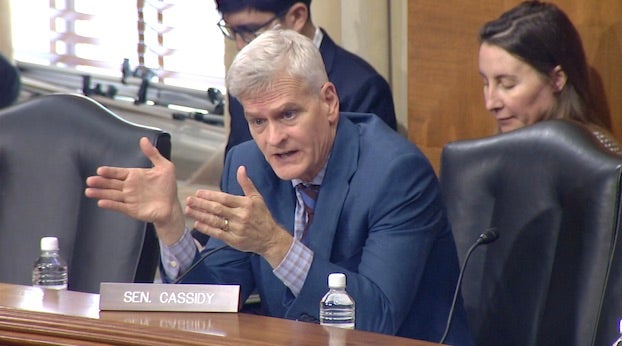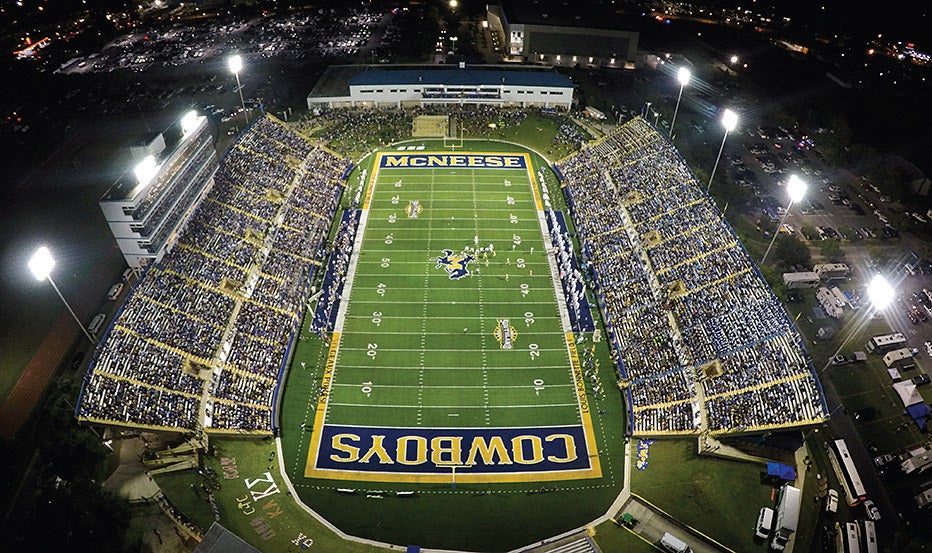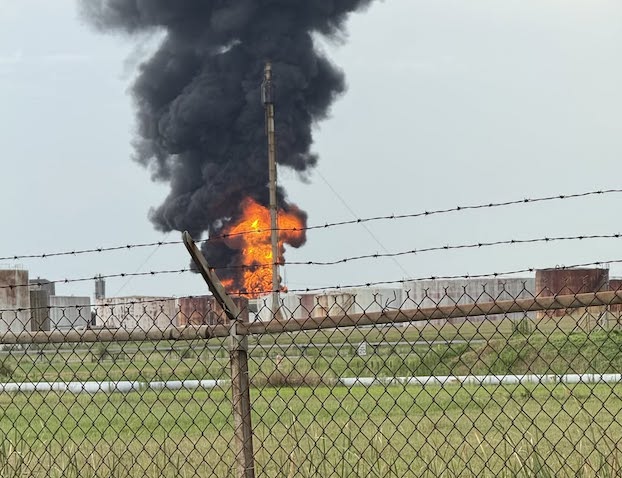The Pryce name — and what it stood for — remembered in SW La.
Published 8:15 am Wednesday, October 2, 2024

- Joyce Sonnier of the Calcasieu Parish SWLA Genealogical & Historical Library looks over a display of the Pryce family history. (Rita LeBleu / American Press)
Three generations of Pryce men and their families left an indelible mark on Lake Charles. Joyce Sonnier from the Calcasieu Parish SWLA Genealogical & Historical Library highlighted the family’s contributions Tuesday. The two-hour event, originally scheduled to be held in the genealogical library, had to be moved to the Allen P. August Sr. Multipurpose Center to accommodate participants.
“The Pryce family was not just one of the most successful Black families in Lake Charles,” Sonnier said. “They were one of the most successful historic families in Lake Charles, period. The Pryce family left a significant mark on the city through their charitable works, groundbreaking businesses and their selfless public service to the community and the people they care about so deeply.”
Sonnier’s interest in the Pryce family began when she was researching the Ball family around 2018.
Trending
“I came across many families closely connected to the Ball family, and the Pryce family was one that caught my interest right away,” she said. “The Pryce family name was a well known name I often heard growing up, but I never knew just how important this family was to our city’s history,” Sonnier said.
Many people are familiar with the Pryce Pharmacy. It celebrated its 100th anniversary in 2008. At that ceremony, Johnnie A. Mouton said the impact and longevity of Pryce’s Pharmacy has spanned generations, served as the apex of the community and still has a great positive impact 100 years later. “None of us here can’t recall when Pryce’s Pharmacy wasn’t here.”
In the same article, former ambassador to the U.N. Andrew Young, who attended the celebration, said that the pharmacy was one place that was free of racial struggles during the Civil Rights movement, the only place in the South where he could sit at the corner and have his cousin make him a milkshake.
It was the 2nd black-owned pharmacy to be established in the state. The first was in New Orleans. But unless one grew up in the community, they may not know the extent of this family’s legacy beyond the long-time successful business.
Sonnier’s timeline began with Dr. George Samuel Pryce (Jan. 10, 1863-Sept. 6, 1932). Born in Jamaica, his father was a lawyer and his name appears on at least one passenger crew list to America in 1886.
George came to the United States to advance his education, attending medical college in Nashville, the first medical school in the South for African Americans, Sonnier said. Upon his graduation, he was honored as a prize winner for “best average (grade) on his final examination.”
Trending
He traveled throughout the South as a doctor, and his name appears on a Franklin, Louisiana census before it appears on the Lake Charles census.
He came to Lake Charles to make a better living for his family around 1908, opened the business on the corner of Enterprise Boulevard and Lawrence Street, renamed Pryce Street in 2010 to honor the family.
The business was more than a pharmacy. The doctor performed surgeries in the back of the pharmacy, which was a necessity, Sonnier said, because of segregation.
“Black families were not able to receive quality medical services during this time,” she said. “A place like Pryce’s Pharmacy was groundbreaking for its time, especially in the deep south.”
In a New Orleans online article about the family, What the Doctor Ordered, George’s grandson Frank Pryce described it as a place where a person could come and get a tonsillectomy and an ice cream cone afterward.
In 1918, the George Pryce family moved away to Los Angeles, but not before Pryce had helped organize and contribute to the building of the Second Ward Colored School and helped contribute to the building of the Warren ME Church where he was a trustee.
Dr. George Pryce operated a successful pharmacy in Los Angeles, and he was director of Golden State Mutual Life Insurance Company.
One of George and Dora’s nine children, Dr. Ulric Woodman Pryce (Aug. 24, 1893-June 13, 1972), returned to Lake Charles to continue the family business in 1917. He served in WWII, and attended Dillard and Howard universities. A 1940 census has the family of seven living at 317 Louisiana Avenue in Lake Charles.
In 1942, the American Press ran the article headlined, Pharmacy Ably Serves Colored People. The article elaborated on the modern services and products, exhaustive knowledge and 35 years of experience of Ulric Pryce and his pride in compounding prescriptions. It also mentions the popular soda fountain.
“This is a black-owned pharmacy y’all that had a whole article praising it in 1942,” Sonnier said.
She was to find other articles praising Uric Pryce’s business and achievements.
Dr. Ulric Young Pryce was one of the founders of the National Pharmaceutical Association and served as its first president.
“Like his father, George, Ulric also worked in and then owned an insurance business.”
He was a principal in the building of the Prince Hall Grand Lodge of Louisiana and a 33rd Degree Mason, an honorary recognition.
Pryce made history as the first black man to be admitted to full membership in the Louisiana State Pharmaceutical Association in 1969.
“He noted that the membership came 14 years after he had applied but he had not given up hope, although it did take him by surprise,” Sonnier read from an article.
Frank Young Price (Nov. 4, 1929-Dec. 8, 2021), one of Ulrick’s five children, stayed in Lake Charles to continue the family legacy. He was only nine years old when he started working at the pharmacy, serving ice cream and sodas, as a delivery boy and as a janitor.
After he graduated from Howard University, he started working in the pharmacy, but it wasn’t until later that he began to manage it.
“I remember one day, when I came to work, I saw my license on the wall. My dad had just put it up. That’s when I knew I was running things,” Sonnier read from her notes.
A local media reported in 2007 that the pharmacy filled prescriptions and carried all of the latest over the counter medicines as well as the old-fashioned such as Black Draught, 666 and Father John’s.
The same article described Pryce’s as a neighborhood gathering place and quoted Frank Pryce as saying, “You learn a lot. You learn how people think. If they need some change in a direction, you nudge them in that direction.”
He was active in, and helped the local community through his membership with Alpha Men of Distinction fraternity, a group that consumed the idea that the fraternity should excel at public service.
It was through this fraternity, Alpha Phi Alpha Fraternity, Inc., Zeta Psi Lambda Chapter, that a scholarship was established in the name of his father, Ulric Pryce.
Dr. Frank Pryce was the first black person appointed to the Board of Commissioners from the Lake Charles Port District.
He was unwavering in his support of the former YMCA that became the Foreman Reynaud Community Center. At one time, there was talk of closing it down. Money and discipline was needed, and Frank Pryce became active in making sure it remained open.
Sonnier had more examples of the family’s contributions than are listed here. She used newspaper clippings and interviews to do it. But much of Pryce’s giving – and it is the spirit of giving for which he is remembered – was not publicized in the American Press, or other publications. It was Matthew 6:3 giving, the right hand didn’t know what the left hand was doing – until Joyce Sonnier invited the public to tell their own stories about how the Pryce family impacted their lives.
Yvonne Malveaux told how a new medication was going to cost her and her husband $500. Frank Pryce told her to order it anyway and maybe she would find the money for it. When it came in, he called her and told her it was paid for.
Jerome Ringo, an environmental justice and advocate of clean energy, said the Pryce family impacted not only Lake Charles, but also Washington DC. In a conversation between Andrew Young and John Lewis, the Pryce name came up.
Some of the information presented by Sonnier was new to Frank’s wife, Delores. She said the question she is asked most is, “What are you going to do with the store?”
Pryce Pharmacy closed its doors in 2017.
“It’s on the market,” she said. “The store and the property around it. However, it is her hope and the hope of others that somehow the location can be recognized as an historic landmark, and that the Pryce name and what it stood for will always be remembered in Southwest Louisiana.





